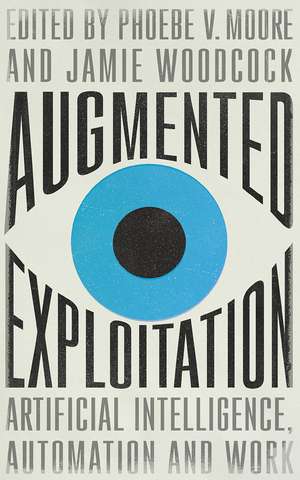Augmented Exploitation: Artificial Intelligence, Automation and Work: Wildcat
Editat de Phoebe Moore, Jamie Woodcocken Limba Engleză Paperback – 19 mar 2021
Artificial Intelligence is a seemingly neutral technology, but it is increasingly used to manage workforces and make decisions to hire and fire employees. Its proliferation in the workplace gives the impression of a fairer, more efficient system of management. A machine can't discriminate, after all. Augmented Exploitation explores the reality of the impact of AI on workers' lives. While the consensus is that AI is a completely new way of managing a workplace, the authors show that, on the contrary, AI is used as most technologies are used under capitalism: as a smokescreen that hides the deep exploitation of workers. Going beyond platform work and the gig economy, the authors explore emerging forms of algorithmic governance and AI-augmented apps that have been developed to utilise innovative ways to collect data about workers and consumers, as well as to keep wages and worker representation under control. They also show that workers are not taking this lying down, providing case studies of new and exciting form of resistance that are springing up across the globe.
| Toate formatele și edițiile | Preț | Express |
|---|---|---|
| Paperback (1) | 151.14 lei 3-5 săpt. | +9.55 lei 5-11 zile |
| PLUTO PRESS – 19 mar 2021 | 151.14 lei 3-5 săpt. | +9.55 lei 5-11 zile |
| Hardback (1) | 600.25 lei 6-8 săpt. | |
| PLUTO PRESS – 19 mar 2021 | 600.25 lei 6-8 săpt. |
Din seria Wildcat
-
 Preț: 206.19 lei
Preț: 206.19 lei -
 Preț: 206.19 lei
Preț: 206.19 lei -
 Preț: 177.89 lei
Preț: 177.89 lei -
 Preț: 170.32 lei
Preț: 170.32 lei -
 Preț: 155.69 lei
Preț: 155.69 lei -
 Preț: 102.46 lei
Preț: 102.46 lei -
 Preț: 107.63 lei
Preț: 107.63 lei -
 Preț: 155.98 lei
Preț: 155.98 lei -
 Preț: 207.31 lei
Preț: 207.31 lei -
 Preț: 232.41 lei
Preț: 232.41 lei -
 Preț: 210.21 lei
Preț: 210.21 lei -
 Preț: 173.51 lei
Preț: 173.51 lei - 8%
 Preț: 650.25 lei
Preț: 650.25 lei -
 Preț: 166.25 lei
Preț: 166.25 lei -
 Preț: 242.78 lei
Preț: 242.78 lei
Preț: 151.14 lei
Preț vechi: 188.93 lei
-20% Nou
Puncte Express: 227
Preț estimativ în valută:
28.93€ • 29.81$ • 24.42£
28.93€ • 29.81$ • 24.42£
Carte disponibilă
Livrare economică 10-24 februarie
Livrare express 25-31 ianuarie pentru 19.54 lei
Preluare comenzi: 021 569.72.76
Specificații
ISBN-13: 9780745343495
ISBN-10: 074534349X
Pagini: 176
Dimensiuni: 135 x 216 x 15 mm
Greutate: 0.27 kg
Editura: PLUTO PRESS
Colecția Pluto Press
Seria Wildcat
ISBN-10: 074534349X
Pagini: 176
Dimensiuni: 135 x 216 x 15 mm
Greutate: 0.27 kg
Editura: PLUTO PRESS
Colecția Pluto Press
Seria Wildcat
Notă biografică
Phoebe Moore is Associate Professor of Political Economy and Technology based at the University of Leicester School of Business and a Research Fellow at the Social Science Center Berlin (WZB). Her most recent book is The Quantified Self in Precarity: Work, Technology and What Counts (Routledge, 2018). || Jamie Woodcock is a researcher based in London. He is the author of The Gig Economy (Polity Press, 2019), Marx at the Arcade (Haymarket, 2019), and Working The Phones (Pluto, 2016). His research focuses on labour, work, the gig economy, platforms, resistance, organising, and videogames.
Cuprins
Introduction Part I: Making It 1. ‘The Mirror for (Artificial) Intelligence: Working in Whose Reflection?’ - Phoebe V Moore (University of Leicester) 2. ‘It Gets Better with Age(?) AI and the Labour Process in 'Old' and 'New' Gig-Economy Firms’ - Adam Badger (University of Oxford) 3. ‘A Sense of Autonomy in the Algorithmic Panopticon’ - Benjamin Herr (University of Vienna) 4. ‘AI, Routine Work and Skilled Jobs’ - Craig Holmes (University of Oxford) 5. ‘The Power of Prediction: People Analytics at Work’ - Uwe Vormbusch (Environment Agency) and Peter Kels (Lucerne University of Applied Science and Art) 6. ‘Manufacturing Consent in the Gig Economy’ - Luca Perrig (University of Geneva) Part II: Faking It 7. ‘Putting the Habitus to Work: Digital Prosumption, Surveillance and Distinction’ - Eduard Müller (University for International Cooperation) 8. ‘Automated and Autonomous? Technology as Mediator in Labour Subjectivation’ - Beatriz Casas González 9. ‘The Banking Labour Process: Contradictions Among Automation, New Mechanisms of Control and the Construction of Customer Confidence’ - Giorgio Boccardo (University of Chile) Part III: Breaking It 10. ‘Work Now, Profit Later: AI between Production and Finance’ - Toni Prug (Queen Mary, University of London) and Paško Bilic (Institute for Development and International Relations, Croatia) 11. ‘’Room to move': Self-quantification, sousveillance & the shared curation of data’ - Frederick Harry Pitts (Unviersity of Bristol) 12. ‘Breaking Digital Atomisation: Resistant Cultures of Solidarity in Platform-Based Courier Work’ - Heiner Heiland (Technical University Darmstadt) and Simon Schaupp (University of Basel) 13. ‘Resisting the Algorithmic Boss: Guessing, Gaming, Reframing and Contesting Rules in App-Based Management’ - Joanna Bronowicka (European University Vadrina, Frankfurt) and Mirela Ivanova (University of Oxford) Conclusion
Descriere
Artificial intelligence should be changing society, not reinforcing capitalist notions of work
